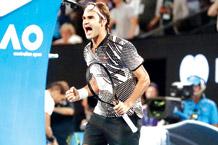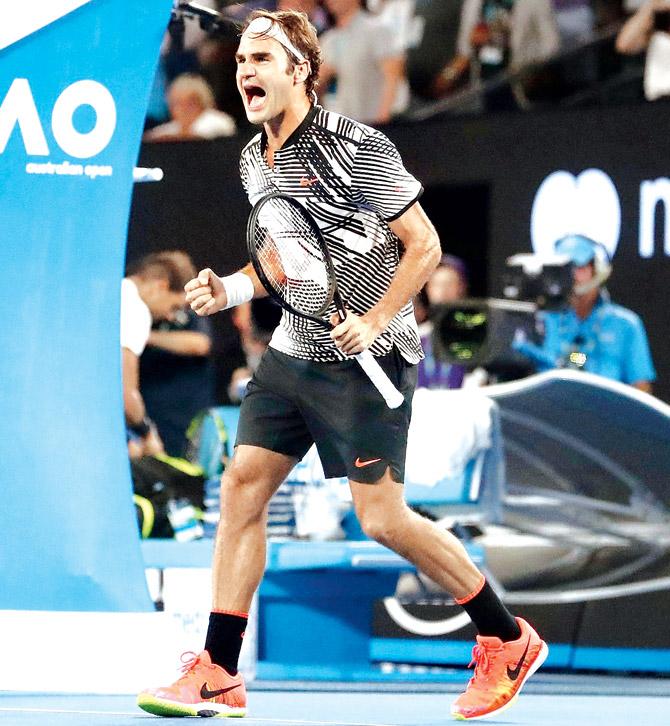Some may say enough has been written about Federer's greatness, but his sheer bulk of achievement has proved them wrong, always

Roger Federer celebrates his victory against Spainu00e2u0080u0099s Rafael Nadal during the men's singles final of the Australian Open in Melbourne on Sunday. Pic/AFP

Roger Federer celebrates his victory against Spain’s Rafael Nadal during the men's singles final of the Australian Open in Melbourne on Sunday. Pic/AFP
ADVERTISEMENT
 Mother, do something," I yelled involuntarily as Roger Federer was broken in the opening game of the fifth set of the final of the Australian Open on Sunday. It had been gripping, nail-biting, awe-inspiring so far, but now it was getting desperate. On the line was a beyond-historic 18th Grand Slam singles title for Federer and an equally rare 15th Grand Slam singles title for Rafael Nadal.
Mother, do something," I yelled involuntarily as Roger Federer was broken in the opening game of the fifth set of the final of the Australian Open on Sunday. It had been gripping, nail-biting, awe-inspiring so far, but now it was getting desperate. On the line was a beyond-historic 18th Grand Slam singles title for Federer and an equally rare 15th Grand Slam singles title for Rafael Nadal.
In the intense rivalry of these two tennis stars, Nadal had the numbers over Federer, especially and including Grand Slam finals. Federer had been out of action for six months, recovering from knee surgery and back problems. He had been written off in that time through a rocky early 2016. As had been for Nadal. The current in-form players were Novak Djokovic and (Sir) Andy Murray.
The challengers too were a-plenty. Well-known names like Stan Wawrinka, Gael Monfils, Milos Raonic, Kei Nishikori, Grigor Dimitrov and David Goffin. New, upcoming talent like Alexander Zverev, Dominic Thiem and Nick Kyrgios.
And yet, Djokovic and Murray were dismissed early in week one. And Federer and Nadal managed to sweep the others off the court — whether in easy strokes or tough five-setters —defying age, predictions, injuries, contenders, the tennis world itself.
But what do you do as a fan if you do not keep the faith? Some might argue that enough has been written and said about Federer's sublime greatness. But Federer's sheer bulk of achievement, if not his magical ability, has proved them wrong time and again. As he reached finals and lost to Djokovic in the past two years, your heart broke. But even as it did, you revelled in and marvelled at his prowess and his artistry. No sports pundit's supposed "expertise" can take that away from you.
Just about every sports pundit has been talking through his or her hat when it comes to Federer anyway, since 2011 onwards. The long drought of no Grand Slam titles between 2012 and 2017 added grist to their mill.
And yet. Here we are in January 2017. Here we are with Federer beating Nadal in a Grand Slam singles final. Here we are with Federer adding to his tally of titles, reaching a never-before 18 in the men's game, one more than his never-before 17. We are now in unknown territory, unclaimed land. Anything may happen and even if nothing happens, Federer has boldly gone where no man has been before.
And the way he did it was miraculous and stupendous. To beat the dangerous Berdych like this was the Federer of old days — majestic, controlling. To beat Nishikori, a tough, talented young player in five sets. To beat Wawrinka, who is gritty, intelligent, and ingenious, in another dramatic five-setter. In none of these matches did Federer display those vulnerabilities which had crept into his game. He fought back and reclaimed his dominance.
And that is how Federer played against Nadal as well, against whom he has had the most consistent set of vulnerabilities. He told himself to be free, and that is how he went forth. The infamous one-handed backhand to a double-handed leftie forehand combination, which allowed Nadal to bully Federer, did not work. A fluid and strong topspin backhand plus an imperious forehand did the damage for Federer. Nadal fought as only Nadal can but for the first time since 2007, he fell short.
How does a player re-invent himself at the age of 35? How does he play a dangerous rival who has got the better of him in exactly such situations and turn the tables on him? How does he allow his mind to free itself of fears and doubts? None of this should have happened according to common sense, and yet, this is Federer: Triumphant, superb, sublime, delicate, dominant, creative and destructive.
My mother and I watched Federer and tennis together since 2003, either in the same room or through constant mobile contact. She died on January 8, having managed to watch a bit of Federer in the Hopman Cup from her hospital bed studiously ignoring nurses and physiotherapists as they milled around.
I don't know if she heard me yelling, "Do something." As a devout atheist she had no belief in the afterlife and no truck with maudlin sentimentalism. But Federer did it anyway. Thank you. Through my tears, thank you.
Ranjona Banerji is a senior journalist. You can follow her on Twitter @ranjona Send your feedback to [email protected]
 Subscribe today by clicking the link and stay updated with the latest news!" Click here!
Subscribe today by clicking the link and stay updated with the latest news!" Click here!






